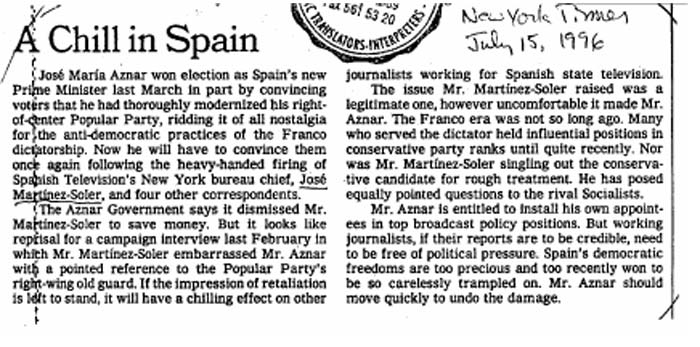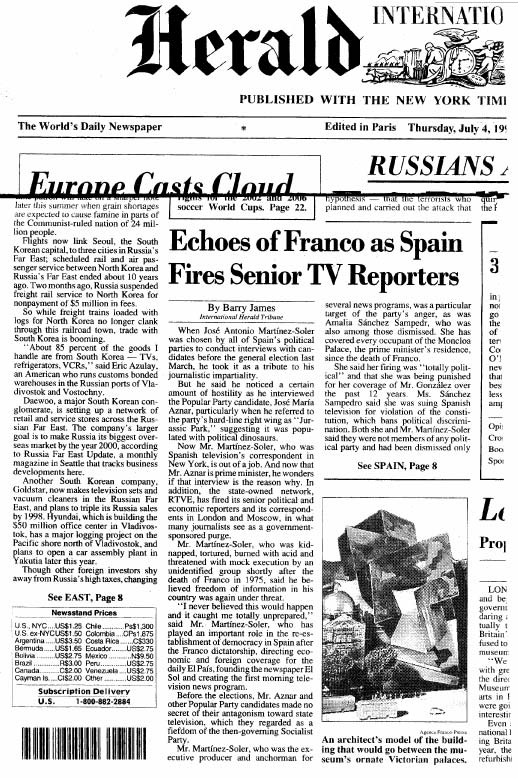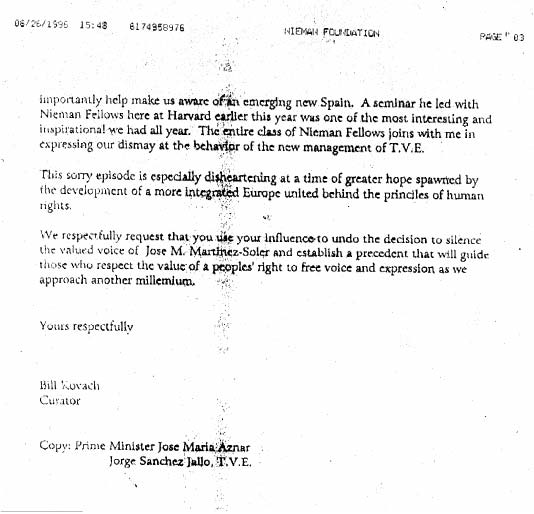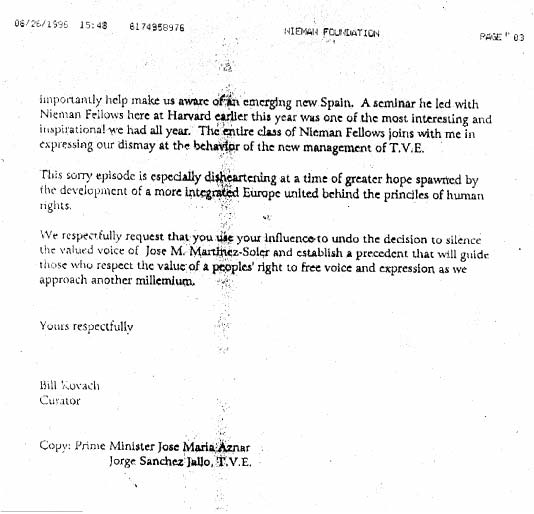La «cacería» contra el juez Garzón ha sumido al Tribunal Supremo en el mayor ridículo de nuestra historia democrática. La prensa internacional de prestigio está tan escandalizada como buena parte de los demócratas españoles. Y tiene difícil remedio a corto plazo. El Tribunal Supremo ha cosechado el dudodo honor de partir a España en dos. Otra vez. Numerosos juristas de prestigio no han dudado en calificar la persecución contra Garzón de «cacería». Y, a mi juicio, no les falta razón. A los jueces de Supremo se les ha visto demasido el cartón: ¿vengazas, envidias, premeditación, deudas, ideología…? Quizás un poco de todo pues Garzón, que no es perfecto -y le conozco hace tiempo- ha pisado muchos callos a la derecha y a la izquierda, al servicio de la Justicia, y se ha ganado numerosos y poderosos enemigos (de ahí le viene buena parte de su grandeza).
Numerosos juristas de prestigio no han dudado en calificar la persecución contra Garzón de «cacería». Y, a mi juicio, no les falta razón. A los jueces de Supremo se les ha visto demasido el cartón: ¿vengazas, envidias, premeditación, deudas, ideología…? Quizás un poco de todo pues Garzón, que no es perfecto -y le conozco hace tiempo- ha pisado muchos callos a la derecha y a la izquierda, al servicio de la Justicia, y se ha ganado numerosos y poderosos enemigos (de ahí le viene buena parte de su grandeza).
 El Gobierno del PP y portavoces de la derecha española lamentan la pésima imagen que, a su juicio, estamos dando de la justicia española algunos ciudadanos, los políticos de la oposición, los intelectuales, etc..
El Gobierno del PP y portavoces de la derecha española lamentan la pésima imagen que, a su juicio, estamos dando de la justicia española algunos ciudadanos, los políticos de la oposición, los intelectuales, etc..
Parece como si el responsable del desaguisado actual y del hazmerreir mundial (¡menudo trabajo!) no hubiera sido el propio Tribunal Supremo con su «cacería» premeditada contra el juez Garzón, el instructor y único condenado, por ahora, del caso Gurtel, el mayor caso de corrupción de los políticos del PP.
Recuerdo ahora cuando un grupo de periodistas jóvenes nos reuniamos en semiclandestinidad bajo la lámpara checa de la Asociación de la Prensa de Madrid en Callao (que luego fue mi despacho en 20 minutos).
Miguel Angel Aguilar, con la agudeza y la retranca que le caracterizan, solía repetirnos que el dictador Francisco Franco se decía responsable «ante Dios, ante la Historia». Y Miguel Angel añadía «… y ante la prensa extranjera» Y, afortunadamente, parecía verdad. La Dictadura franquista era extremadamente sensible a la prensa extranjera, o sea, al qué dirán.
Cuando escuché a la vicepresidenta del Gobierno y a la portavoz del Consejo General de Poder Judicial lamentar la imagen que estábamos dando de la Justicia española ante el mundo me entraron los mismos escalofríos que debió sentir el responsable del editorial que publicó anteayer el diario The New York Times (el segundo en una semana, despues del que provocó las iras de Jimenez Losantos) titulado
«Un veredicto escalofriante en España».
Lo copio y lo pego a continuación:
February 10, 2012
A Chilling Verdict in Spain
http://www.nytimes.com/2012/02/11/opinion/a-chilling-verdict-in-spain.html?ref=baltasargarzon
The enemies of Judge Baltasar Garzón have finally gotten their way.
Spain’s Supreme Court this week found the judge guilty of misapplying the
country’s wiretap law and suspended him from the courts for 11 years.
Judge Garzón has played an important role in Spain’s transition to
democracy, as a scourge of corrupt politicians left and right and a
powerful champion of international human rights law. His efforts to
prosecute the former Chilean dictator, Gen. Augusto Pinochet, and
investigate the horrors of the Spanish Civil War era, though unsuccessful,
advanced the principle that there can be neither amnesty nor impunity for
crimes against humanity.
Thursday’s ruling stemmed from prison wiretaps of conversations between
lawyers and their clients that the judge ordered in a 2008 case involving
bribes allegedly paid to local officials of the now-ruling Popular Party.
Judge Garzón was not alone in ordering those wiretaps, but he alone was
prosecuted, even while the public prosecutor argued that there were no
grounds for a criminal proceeding. Convicting a jurist over a court ruling
is an appalling attack on judicial independence. Two other cases against
him are pending — one involving his inquiry into mass killings during the
civil war and the Franco dictatorship, and another concerning allegations
of conflict of interest in a tax fraud case.
Judge Garzón is far from perfect, but the decision by the Spanish Supreme
Court to remove him from the bench is enormously damaging to the prospects
of fair and impartial justice. What investigating magistrate would not now
hesitate before pursuing politically sensitive cases? Will the Franco-era
crimes that scarred Spain for two generations remain forever
uninvestigated?
Judge Garzón cannot appeal in the Spanish court system. But he can
challenge this decision in Spain’s Constitutional Court and the European
Court of Human Rights in Strasbourg. We hope he does. As this week’s
miscarriage of justice plainly demonstrates, Spain still needs his help in
keeping its judiciary fearless and independent.
20minutos.es ha hecho este resumen:
Nuevo editorial de ‘The New York Times’
El diario norteamericano The New York Times dedicó este viernes un editorial a la condena a Garzón. El texto comienza afirmando que «los enemigos del juez Garzón se han salido con la suya«.
Aseguran que este fallo del Supremo es un «enormemente perjudicial para las perspectivas de la independencia judicial«, y recuerdan los dos procesos que tiene aún pendientes el juez: el cobro de unos cursos del Banco Santander en Nueva York, y la causa por la investigación de los crímenes del franquismo. Sobre esta última cuestión, el NYT se pregunta si permanecerán «sin ser investigados para siempre», dado los problemas a los que se ha enfrentado Garzón por intentar abrir una investigación sobre lo ocurrido en la dictadura de Franco.
Finalmente, destacan su esperanza de que el juez recurra la sentencia, a la vez que le definen como «lejos de ser perfecto». Sin embargo, aseguran que España le necesita «para mantener un poder judicial independiente y valiente».
—












